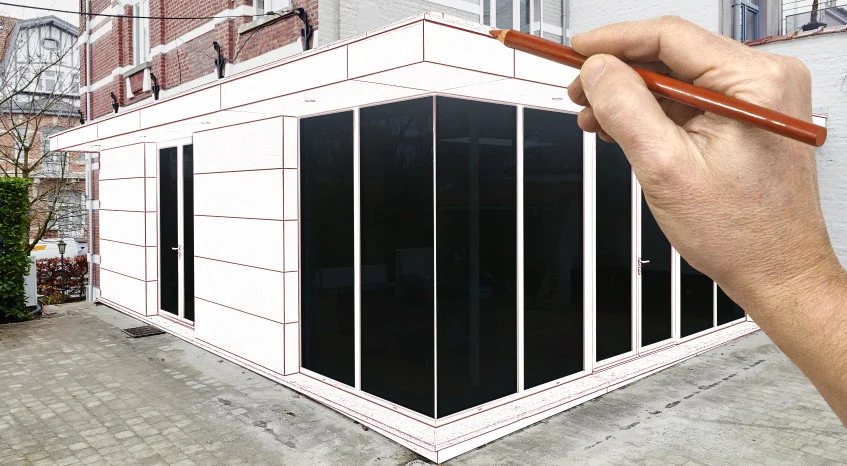
Whether you’re considering a kitchen extension, wrap-around extension or double storey extension there are many ways you can keep in budget and save money. From the initial designs to cutting the cost of labour, take a look at our 9 simple and effective tips.
Creating a modern, functional and practical extension without breaking the bank is easy just follow these simple rules.
2. PLANNING AND STICKING TO YOUR BUDGET
You should always have a contingency budget in case anything unforeseen happens. However, you can still bring down the costs of any project by simply planning your budget and sticking to it. Spend some time planning, budgeting and shopping around for even the smallest of details so everything is covered.
3. KEEP THE DESIGN SIMPLE
When designing your extension keep it simple. Curves and corners cost money. The more angles and corners, the more money you will pay for labour and materials costs. The cheapest options is a simple rectangular or square shape. A good Architectural Designer will be able to advise on the best design to keep the costs down while incorporating a high-value design.
4. KEEP IT SMALL!
You can save on Planning fees by making sure your extension falls within the Permitted Development Rights. This means that you won’t have to submit a full householder application to the council and this will save you £206 application fee and the time it takes for the planner to issue a decision. There are certain limitations and conditions that need to be met for your extension to fall within the Permitted Development Rights. Read more on permitted development here.
5. AVOID MADE TO MEASURE AND SPECIAL-ORDER PRODUCTS
Now more than ever you can buy off the shelf products that are just as good, if not better then trendy more bespoke products. Stick to standard-size doors and windows. Velux windows in the roof will be a lot cheaper than a roof lantern. If you really want to cut the costs don’t have any roof windows.
6. REUSE, RECYCLE OR REPAIR
Just because you’re getting a new extension it doesn’t mean you need to rebuy everything new, so before you throw away any of your old materials, think about selling, reusing or upcycling them. Floorboards can be easily sanded or painted, the same can also be said for kitchen units and worktops. Shop around for Salvaged materials, try second-hand shops or salvage yards, these places can work out a lot cheaper than buying everything brand new and may even add a little more character to your project.
7. AVOID COMPLICATED GROUND WORKS
If possible, avoid complicated groundworks, such as building near to trees or drains and sewers, or other buried services, all these will increase your groundwork costs. Remember, though, that if you live in a Conservation area your choices may well be limited.
8. PARTY WALL ACT
If you plan on building on or near the boundary of your neighbouring properties, your extension will need to comply with the Party Wall Act (communities.gov.uk). If you do need a party wall settlement it will cost approximately £700 per neighbour, possibly more if they insist on using their own independent surveyors. If you can get a written agreement from your neighbours, you can avoid using a surveyor and this can save hundreds of pounds in fees. It pays, therefore, to keep your neighbours happy. Discuss your plans with them, be considerate it could end up saving you hundreds of pounds.
9. AVOID COWBOY BUILDERS
Cowboy builders are known as cowboys because they will underestimate the cost to secure a job. Afterwards, they will ask you for more money for every little change to the plan, as an extra. They may even demand a percentage of the cost or in some cases all the money upfront, leaving you with little or no comeback if they fail to complete the work.



